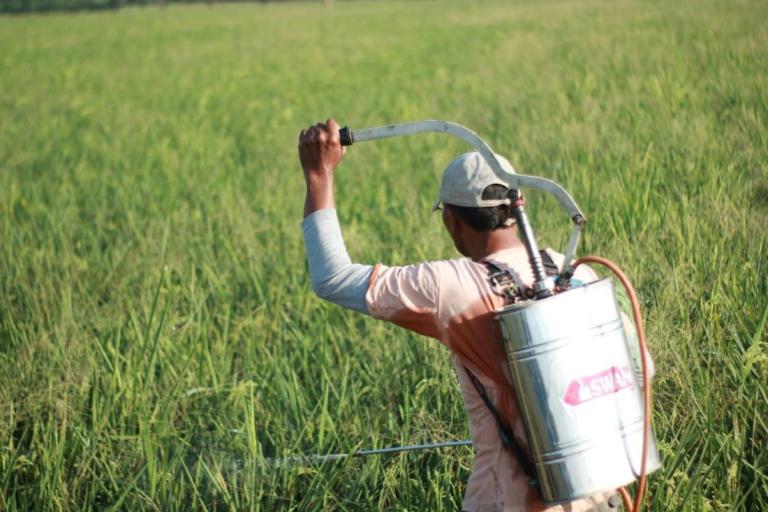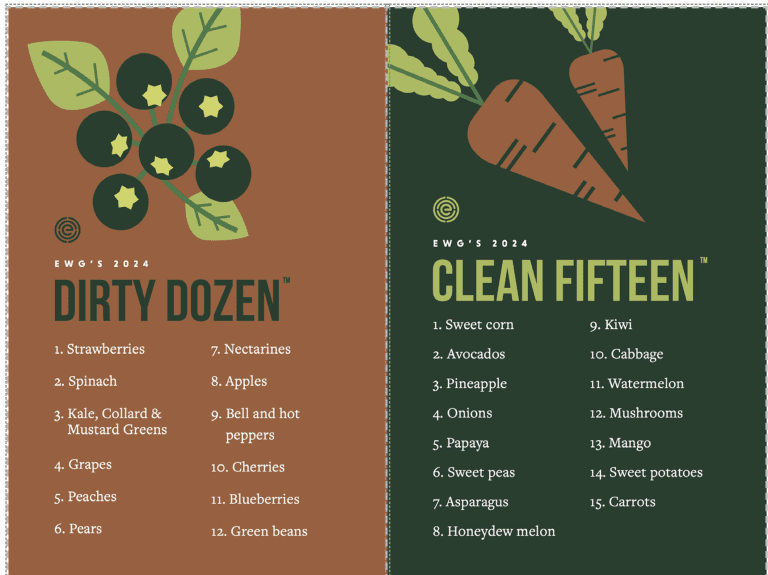Protecting nature and human health from the dangers of pesticides is one way that churches can live into their vocation of caring for God’s Creation.

Here are ideas for reading and preaching Deuteronomy 4:1-2 and Mark 7:1-8, 14-23. This is part of the EcoPreacher 1-2-3 series to equip preachers and congregations for engaging the Bible through an ecological lens. These texts are assigned as part of the Revised Common Lectionary for the fifteenth Sunday after Pentecost.
Eco-Exegesis
Eco-exegesis is a method of interpreting the biblical text through a green lens using the principles of ecological theology.
Deut. 4:1
So now, Israel, give heed to the statutes and ordinances that I am teaching you to observe, so that you may live to enter and occupy the land that the Lord, the God of your ancestors, is giving you.
These verses are part of Moses’s final speech to the people of Israel recalling their history from the time they departed Mount Horeb (Sinai) to when they arrived east of the Jordan poised to enter the promised land. Just prior to these verses in chapter 4, God shows Moses the view of the land that his people will enter – “that good hill country” (Deut. 3:25). Moses himself will not be able to enter the land, but God tells him to encourage Joshua who will assume leadership after he has died.
The precautionary principle
God is giving the Israelites a heavy responsibility as they “enter and occupy the land” (Deut. 4:1). They must keep God’s commandments and live in ethical relationship with each other and with the land itself.
A few verses later, God tells them to “take care and watch yourselves closely” (Deut. 4:9). Rabbis across the ages have said that this admonition applies to caring for one’s own body, the health of the community, and the flourishing of the land. Rabbis Yonatan Neril and Leo Dee explain that “This relates closely to the precautionary principle, which involves taking preventive action in the face of uncertainty” (Eco Bible Vol. 2, 133).
Neril and Dee encourage us to apply this ancient teaching to the way we grow our food and the use of pesticides. They point out that pesticides are linked to acute and chronic illnesses, including cancer. They also have negative impacts on biodiversity, notably pollinators such as bees. And when used without appropriate safety protocols, pesticides can be toxic to farm workers applying them (Eco Bible Vol. 2, 133—34).
According to Statista Research Department, “From 1990 to 2021, the worldwide agricultural use of pesticides steadily increased, reaching 3.54 million metric tons in 2021.” We must wonder how this squares with God’s command to take care of the land, our bodies, and communities.

Mark 7:20-23
“Jesus said, ‘It is what comes out of a person that defiles. For it is from within, from the human heart, that evil intentions come: fornication, theft, murder, adultery, avarice, wickedness, deceit, licentiousness, envy, slander, pride, folly. All these evil things come from within, and they defile a person.’”
It may at first seem shocking that Jesus defended his disciples for eating with unwashed hands. But Jesus’s dispute with the religious leaders had less to do with sanitation practices than with their hypocrisy of insisting that others follow purity laws while they themselves flout the ethics of God’s commands. This leads Jesus to conclude that the evil intentions within a person do more damage than any external factors.
Returning to the use of pesticides, we can make the case that the indiscriminate overuse of these poisons has a direct link to one of the evil intentions Jesus names: avarice. While increased food production is needed for a growing population, the greed for increased crop yields and profits, combined with cost-cutting measures of using cheaper, more dangerous pesticides does more harm than good.
The overuse of pesticides and other chemicals harms helpful insects and leads to soil degradation. Pesticides also contaminate water and poison ecosystems. Pregnant mothers and young children are especially susceptible to the toxicity of pesticides.
So, what can churches and other houses of worship do to address the problem of pesticides?
Education, advocacy, and community engagement are ways to leverage influence. For example, your congregation could promote organic and sustainable farming such as organizing sign-ups for community-supported agriculture (CSA).
Congregations can also support policy changes regarding pesticide use by advocating for local, state, or national regulations that reduce the use of harmful pesticides. Petition drives, letter-writing campaigns, or meetings with policymakers are all ways to get involved.
Also, if your church has enough land, consider starting a community garden that uses organic and sustainable practices. This can serve as a model for the community of what is possible for healthier farming. Or if you don’t have the land, you can partner with another congregation and offer volunteers to help plant, weed, and harvest fresh produce for local food banks or church events.
By working with local leaders and other houses of worship, churches can not only address the problem of pesticides but also promote broader environmental health and community well-being. In this way we can protect the good land that God created.
1 Eco-Idea
The Eco-Idea is one succinct statement that tells us who God is and/or what God does in relation to Creation and how we should respond as people of faith.
Protecting nature and human health from the dangers of pesticides is one way that churches can live into their vocation of caring for God’s Creation.
2 Eco-Questions
Eco-Questions are what we can ask to help a congregation draw out the implications of the Eco-Exegesis and Eco-Idea.
- Did you know there are healthy alternatives to pesticides? Check out these sites with information about integrated pest management and agroecology.
- Can you guess which organizations spend the most money to stop the regulation of pesticides? Tyson Foods and Monsanto are just two of the fifteen powerful pro-agrichemical lobbyists profiled here.
3 Eco-Actions
Eco-Actions are ways that a congregation might respond to the Eco-Idea and Eco-Questions. One of these possibilities may have salience for your ministry context.
1 – Educate.
Organize a series of educational events that inform congregants and the community about the environmental and health risks associated with pesticide use, as well as alternative, sustainable practices.
2 – Buy organic.
Try switching some items in your shopping cart to organic. Consult the Environmental Working Group website, https://www.ewg.org/, to find the “dirty dozen” and “clean fifteen” fruits and vegetables.

3 – Support local organic farmers.
When possible, purchase local, organic foods at farmers markets. Discuss the possibility of your church hosting or tabling at a local farmers market.
Read also:
Gleaning Divine Abundance: Isaiah 55:1-5; Matthew 14:13-21
A Divine Cycle of Reciprocity: Preaching The Parable of the Sower
Food & Faith: Preaching Deuteronomy 4 Through a Green Lens
EcoPreacher 1-2-3 is a partnership between the Rev. Dr. Leah Schade and the Interfaith Center for Sustainable Development, publishers of Eco Bible, a Jewish ecological commentary on the Hebrew Scriptures. EcoPreacher 1-2-3 provides Creation-centered sermon preparation that is short, accessible, and based on a solid biblical foundation. To see other EcoPreacher ideas and to sign up to receive future EcoPreacher 1-2-3 installments, click here.

The Rev. Dr. Leah D. Schade is the Associate Professor of Preaching and Worship at Lexington Theological Seminary in Kentucky and ordained in the ELCA. Dr. Schade does not speak for LTS or the ELCA; her opinions are her own. She is the author of Preaching in the Purple Zone: Ministry in the Red-Blue Divide (Rowman & Littlefield, 2019) and Creation-Crisis Preaching: Ecology, Theology, and the Pulpit (Chalice Press, 2015). She is the co-editor of Rooted and Rising: Voices of Courage in a Time of Climate Crisis (Rowman & Littlefield, 2019). Her newest book is Introduction to Preaching: Scripture, Theology, and Sermon Preparation, co-authored with Jerry L. Sumney and Emily Askew (Rowman & Littlefield, 2023).













